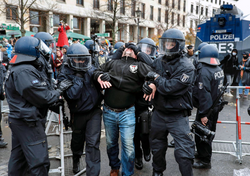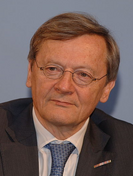2008 Greuningian State Chamber attack: Difference between revisions
Neuleinster (talk | contribs) |
Neuleinster (talk | contribs) |
||
| (7 intermediate revisions by the same user not shown) | |||
| Line 67: | Line 67: | ||
| sidebox = | | sidebox = | ||
}} | }} | ||
The '''2008 Greuningian State Chamber attack''' on November 28, 2008 was an attack by supporters of the then-outgoing [[Greuningia]]n Governor [[Alexander von Wiest]] on the [[Greuningian parliament building]], where the inauguration of the new BVP-SDU state government was taking place in the [[State Chamber of Greuningia]] at the time of the attack took place. The operation, unique in Besmenia's history, is being treated as domestic terrorism by law enforcement agencies. | The '''2008 Greuningian State Chamber attack''' on November 28, 2008 was an attack by supporters of the then-outgoing [[Greuningia]]n Governor [[Alexander von Wiest]] on the [[Greuningian parliament building]] in [[Richtersburg]], where the inauguration of the new BVP-SDU state government was taking place in the [[State Chamber of Greuningia]] at the time of the attack took place. The operation, unique in Besmenia's history, is being treated as domestic terrorism by law enforcement agencies. The attack received not only national but also high international attention | ||
The aim of the attackers was to prevent the Greuningian State Chamber from swearing in the BVP-SDU state government under BVP governor [[Albrecht Jungmann]], which emerged victorious in the [[2008 Greuningian state election]], and thereby unconstitutionally to help the far-right politician von Wiest to continue his governorship. | The aim of the attackers was to prevent the Greuningian State Chamber from swearing in the BVP-SDU state government under BVP governor [[Albrecht Jungmann]], which emerged victorious in the [[2008 Greuningian state election]], and thereby unconstitutionally to help the far-right politician von Wiest to continue his governorship. | ||
During the attack, an estimated 200 to 400 rioters broke into the State Chamber and disrupted the session of parliament for several hours. Numerous people were injured, including police officers. The [[Greuningian Police]] received support from the Besmenian [[Federal Police (Besmenia)|Federal Police]] and units of the [[Besmenian Federal Army]] at the request of the then mayor of [[Richtersberg]] [[Günther Beilmann]] to the [[Federal government of Besmenia|Besmenian federal government]]. | During the attack, an estimated 200 to 400 rioters broke into the State Chamber and disrupted the session of parliament for several hours. Streets and surroundings near the parliament were also affected by the attacks and protests. Numerous people were injured, including police officers. The [[Greuningian Police]] received support from the Besmenian [[Federal Police (Besmenia)|Federal Police]] and units of the [[Besmenian Federal Army]] at the request of the then mayor of [[Richtersberg]] [[Günther Beilmann]] to the [[Federal government of Besmenia|Besmenian federal government]]. | ||
In the months after the attack, hundreds of von Wiest supporters involved were charged and some sentenced to several years in prison. | In the months after the attack, hundreds of von Wiest supporters involved were charged and some sentenced to several years in prison. | ||
==Background== | ==Background== | ||
{| class="wikitable floatleft" | |||
|- | |||
| [[File:Alexander von Wiest2.png|133px]] ||[[File:Erwin Pröll in Loosdorf.jpg|117px]] | |||
|- | |||
| [[Alexander von Wiest]] || [[Albrecht Jungmann]] | |||
|} | |||
===Before 2008=== | ===Before 2008=== | ||
After the [[1998 Greuningian state election]], a coalition was formed in the Besmenian [[States of Besmenia|federal state]] of Greuningia consisting of the [[National Besmenian Party]] and the [[Besmenian People's Party]] with NBP politician Alexander von Wiest as governor. Domestically, the Greuningian NBP-BVP state government led to harsh criticism at the Besmenian federal level, but was able to achieve success in Greuningia at the same time. As a result, the National Besmenian Party grew in support and Greuningian governor Alexander von Wiest gained popularity, while outside Greuningia he was heavily criticized. After the [[2003 Greuningian state election]], the NBP-BVP state government was confirmed in office. | After the [[1998 Greuningian state election]], a coalition was formed in the Besmenian [[States of Besmenia|federal state]] of Greuningia consisting of the [[National Besmenian Party]] and the [[Besmenian People's Party]] with NBP politician Alexander von Wiest as governor. Domestically, the Greuningian NBP-BVP state government led to harsh criticism at the Besmenian federal level, but was able to achieve success in Greuningia at the same time. As a result, the National Besmenian Party grew in support and Greuningian governor Alexander von Wiest gained popularity, while outside Greuningia he was heavily criticized. | ||
After the [[2003 Greuningian state election]], the NBP-BVP state government was confirmed in office. | |||
===2008 state election=== | ===2008 state election=== | ||
[[File:Greuningian State Chamber 2008-2013.png|150px|thumb|left|Allocation of seats in the Greuningian parliament after the 2008 election<br/>{{colorbox|#00CED1}} NBP: 44 seats<br/>{{colorbox|#0F0FFF}} BVP: 42 seats<br/>{{colorbox|#FF0000}} SDU: 12 seats<br/>{{colorbox|#FFFF00}} FBBP: 9 seats]] | |||
The then chairman of the [[BVP Greuningia]] [[Hermann Leininger]] announced his resignation in February 2007. He was succeeded by the then Greuningian State Minister for Economy and Finance, [[Albrecht Jungmann]], whose political views were similar to progressive conservatism. When Jungmann was nominated as the BVP's top candidate for the [[2008 Greuningian state election]] in February 2008, there was speculation in the media as to whether the NBP-BVP would not be reconfirmed after the 2008 election. | The then chairman of the [[BVP Greuningia]] [[Hermann Leininger]] announced his resignation in February 2007. He was succeeded by the then Greuningian State Minister for Economy and Finance, [[Albrecht Jungmann]], whose political views were similar to progressive conservatism. When Jungmann was nominated as the BVP's top candidate for the [[2008 Greuningian state election]] in February 2008, there was speculation in the media as to whether the NBP-BVP would not be reconfirmed after the 2008 election. | ||
At the 2008 state election, the NBP was again the strongest party with 37.0% and was able to increase its result from 2003 by 0.9pp. The BVP was the second strongest party with 36.0%, just ahead of the NBP. After the results were announced, von Jungmann ruled out an NBP-BVP coalition, while von Wiest hoped it would continue. The [[Social Democratic Union (Besmenia)|SDU]] and FBBP also ruled out cooperation with the NBP. Eventually, there were coalition talks between the BVP and SDU, both of which together held a scarce majority of 54 seats in the newly elected State Chamber. | |||
==Events== | ==Events== | ||
Latest revision as of 19:44, 27 August 2023
| 2008 Greuningian State Chamber attack | |||
|---|---|---|---|
 Police arrest a rioter near the State Chamber of Greuningia | |||
| Date | 28 November 2008 | ||
| Location | |||
| Caused by |
| ||
| Goals |
| ||
| Methods |
| ||
| Resulted in |
| ||
| Parties to the civil conflict | |||
The 2008 Greuningian State Chamber attack on November 28, 2008 was an attack by supporters of the then-outgoing Greuningian Governor Alexander von Wiest on the Greuningian parliament building in Richtersburg, where the inauguration of the new BVP-SDU state government was taking place in the State Chamber of Greuningia at the time of the attack took place. The operation, unique in Besmenia's history, is being treated as domestic terrorism by law enforcement agencies. The attack received not only national but also high international attention
The aim of the attackers was to prevent the Greuningian State Chamber from swearing in the BVP-SDU state government under BVP governor Albrecht Jungmann, which emerged victorious in the 2008 Greuningian state election, and thereby unconstitutionally to help the far-right politician von Wiest to continue his governorship.
During the attack, an estimated 200 to 400 rioters broke into the State Chamber and disrupted the session of parliament for several hours. Streets and surroundings near the parliament were also affected by the attacks and protests. Numerous people were injured, including police officers. The Greuningian Police received support from the Besmenian Federal Police and units of the Besmenian Federal Army at the request of the then mayor of Richtersberg Günther Beilmann to the Besmenian federal government.
In the months after the attack, hundreds of von Wiest supporters involved were charged and some sentenced to several years in prison.
Background
 |

|
| Alexander von Wiest | Albrecht Jungmann |
Before 2008
After the 1998 Greuningian state election, a coalition was formed in the Besmenian federal state of Greuningia consisting of the National Besmenian Party and the Besmenian People's Party with NBP politician Alexander von Wiest as governor. Domestically, the Greuningian NBP-BVP state government led to harsh criticism at the Besmenian federal level, but was able to achieve success in Greuningia at the same time. As a result, the National Besmenian Party grew in support and Greuningian governor Alexander von Wiest gained popularity, while outside Greuningia he was heavily criticized.
After the 2003 Greuningian state election, the NBP-BVP state government was confirmed in office.
2008 state election
The then chairman of the BVP Greuningia Hermann Leininger announced his resignation in February 2007. He was succeeded by the then Greuningian State Minister for Economy and Finance, Albrecht Jungmann, whose political views were similar to progressive conservatism. When Jungmann was nominated as the BVP's top candidate for the 2008 Greuningian state election in February 2008, there was speculation in the media as to whether the NBP-BVP would not be reconfirmed after the 2008 election.
At the 2008 state election, the NBP was again the strongest party with 37.0% and was able to increase its result from 2003 by 0.9pp. The BVP was the second strongest party with 36.0%, just ahead of the NBP. After the results were announced, von Jungmann ruled out an NBP-BVP coalition, while von Wiest hoped it would continue. The SDU and FBBP also ruled out cooperation with the NBP. Eventually, there were coalition talks between the BVP and SDU, both of which together held a scarce majority of 54 seats in the newly elected State Chamber.
